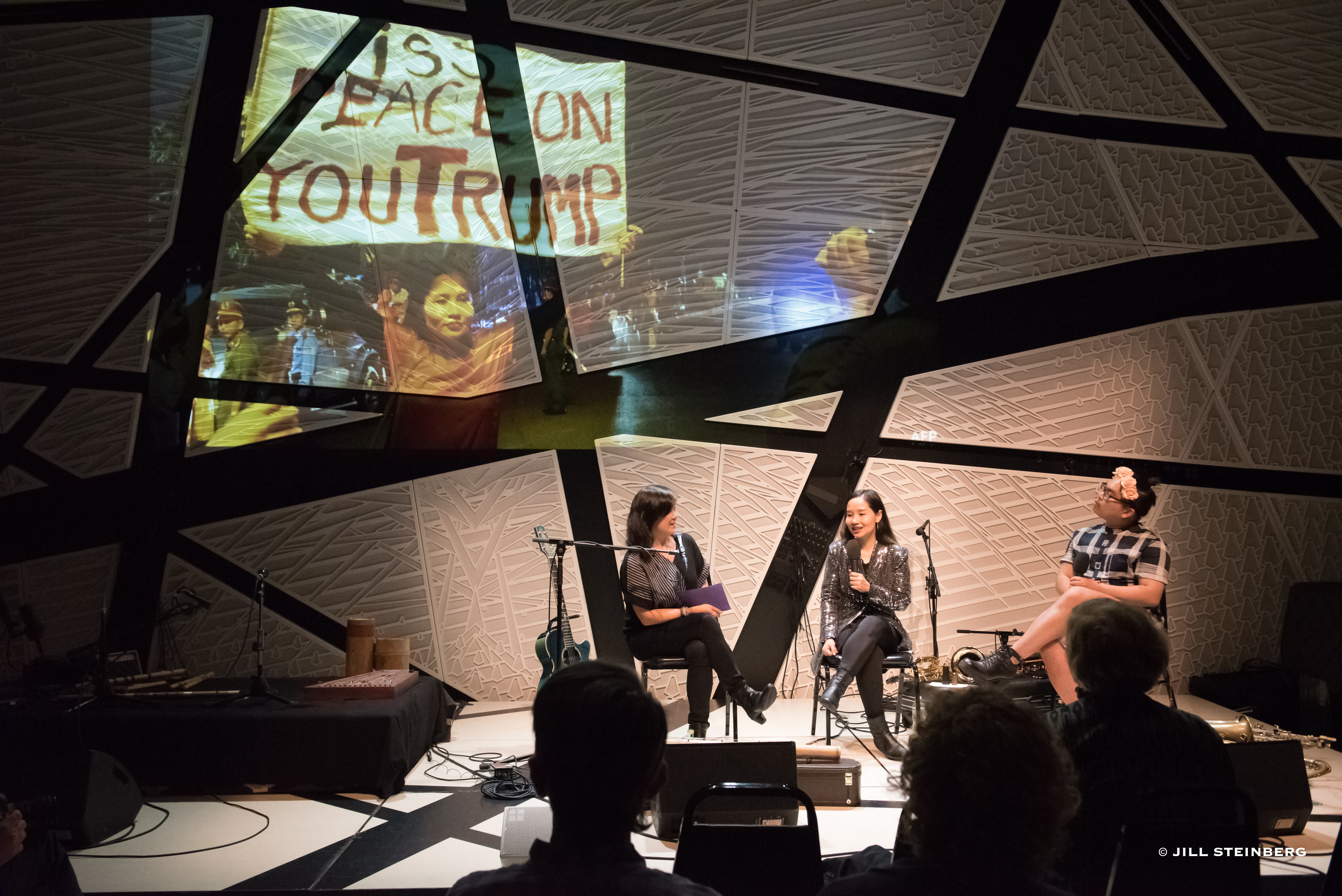Mai Khoi and Paul Tran: A Conversation
National Sawdust
On September 11, ARC in collaboration with Elena Park, the curator of the NS+ series, presented Mai Khoi and The Dissidents + Paul Tran live at National Sawdust. Mai Khoi made her New York debut with this program. In Vietnam, she has been persecuted for her open criticism of the state, particularly as she evolved from her pop star roots into an experimental folk artist chanting lyrics infused with themes of resistance and protest. Together with fellow activist musicians Quyền Thiện Đắc and Nygugen Duc Minh, Mai Khoi and The Dissidents are a luminary voice captivating audiences internationally. They were joined on the bill by the dazzling spoken word poet Paul Tran, winner of the Nuyorican Poets Cafe Grand Slam.
In conversation with Elena Park, Paul Tran and Mai Khoi shared their experiences about Vietnamese politics and heritage, touched upon gender identity, and highlighted the strength of artistic expression in personal and political struggles.
The event was presented in partnership with NationalSawdust+ and PEN America and supported by The Andy Warhol Foundation for the Visual Arts and Artistic Freedom Initiative (AFI).
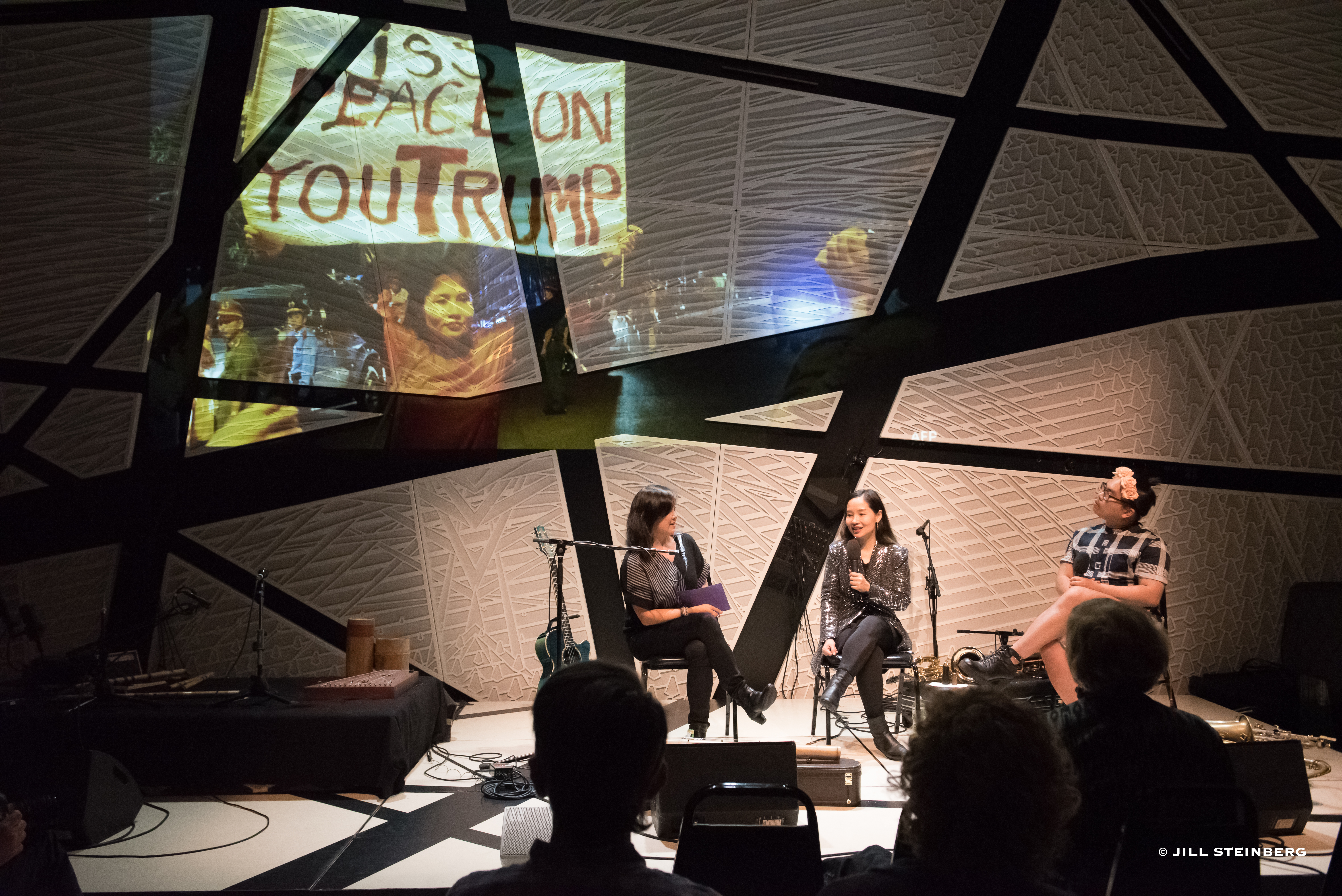
ELENA PARK: From watching you, Mai, I feel that you perform with such courage. Paul, I read that in your poetry, one of the things that you explore is the will to persist, so I’m just wondering if I can ask both of you where you get the courage to do what you do.
PAUL TRAN: I’ve grown up in a family that really believed in trying to leave things behind. My mom left an entire country behind and never wanted me to know about it. She doesn’t want me to know about the circumstances surrounding my birth—who my father was after he disappeared from our life—and I understand that that’s her way of persisting and enduring difficult things. She’s the kind of woman who sees elegance, appearance, performance, and respectability as her tools against circumstance, and that means that whatever has inflicted harm upon her, she erases and pretends isn’t there. As her child I think it was expected that I live and grow up in the same way, but as most rebellious teenagers, I chose a different path. At first, the path of truth-telling felt exciting to me because it brought justice on people who I felt had hurt me or oppressed me, and I think it was also my way of rebelling against my mom, and her authority. However, now I think that courage comes from the fact that it’s not lost on me that people would rather I keep my mouth shut. It’s not lost on me that people’s comforts would remain intact if I go in silence, and, sometimes I feel like I have very little to lose, though I know there’s still so much I could be risking, like my own personal safety. But I enjoy the notion that my version of the truth can be terrifying to those who think they have power over me.
ELENA PARK: Mai Khoi, you are also a truth-teller to people with power—can you talk about this question of courage and what drives you to do what you do?
MAI KHOI: I just do what I feel. I do not know from where, or from what I sing these songs, apart from emotional experience, because I’m an artist. I just feel like artists have a mission in life to express the truth.
ELENA PARK: Paul mentioned family, and Mai Khoi I know that because of the things that you do and speaking out against oppression, your family does come under some pressure as well, and I’m wondering how you balance that responsibility to speak the truth with your personal safety and that of the ones that you love.
MAI KHOI: My parents are normal people in Vietnam. We’ve lived in fear for a long time, and I know my parents are very scared about what I’m doing now. However, people in society hide their emotions very well. They don’t tell the truth. I don’t believe that is the right way to live. I just encourage my parents by telling them that what I’m doing now is not illegal because I know many people are following me. I’m well-known in my country, and I want to change something for my country. I encourage people to step out of the fear and feel free to speak and to do what they want, like me.
“We’re not sure there’s a door in our cage, in our cell, until we see the light fall in.”
— Paul Tran
ELENA PARK: I think that your work does that for people as well, Paul. You were talking about the people who would prefer that you stay quiet, but there must be many people who come to you and say, “Thank you for empowering me” or “Thank you for making us see a different, beautiful perspective in your work.” Is that what you’re finding as well, in addition to the opposition you sometimes encounter?
PAUL TRAN: I think so. One counts one’s Instagram followers sometimes. It’s true. You should do it. That’s a gift that comes as part of the work, but it’s not something that even in my most vain moments I ask for. Maya Angelou has this quote, “There’s no greater agony than bearing an untold story inside you,” and I’ve known the years of my life spent in that kind of agony and the kind of person that I was expected to be, and so I do the work simply as a resistance to that agony. It is my own small form of resistance to what is expected of me inside of my family, what is expected of me by the kind of stereotypes heaped on bodies like mine. I think what it does is give permission, and I know that I’ve been given permission by folks who had to do it before me, who had to do it first for their communities, and I don’t know if there’s anything else that I’m trying to do but keep that door open just a little longer. It was always my impression that we’re not sure there’s a door in our cage, in our cell, until we see the light fall in, or until we feel the breeze come in, and if my work can just keep that door ajar, then we can evacuate all the folks in that room.
ELENA PARK: And was there a moment where something changed or you were able to confront this struggle and start performing or giving your voice wings to share?
PAUL TRAN: A little bit. I was the seventh grader who thought I was going to be an MD/PhD. And then I was a history major in college and thought I would be an academic. But when I was assaulted at school my junior year, I didn’t know that the scholarship program I was a part of was being audited for its effectiveness in pushing minority students into academic pathways, and because the school hadn’t been able to perform, my situation was a liability to them—a liability to their numbers and a liability to their funding. In short of providing the kind of assistance or resources that we thought would be available to students of color at a place like that, I was asked to leave the scholarship program, and my journey to graduation was made almost impossible. I felt really alone in that moment and in trying to figure out why people have investments in their own image, and it had nothing to do with my safety. People prioritize their comfort and their success over my safety, and I think that was a catalyst for me to say “If I don’t mean anything to you, or if that’s the message I’m internalizing, then you probably wouldn’t mind if I open my mouth and say this. You probably didn’t expect this.” That served to push me.
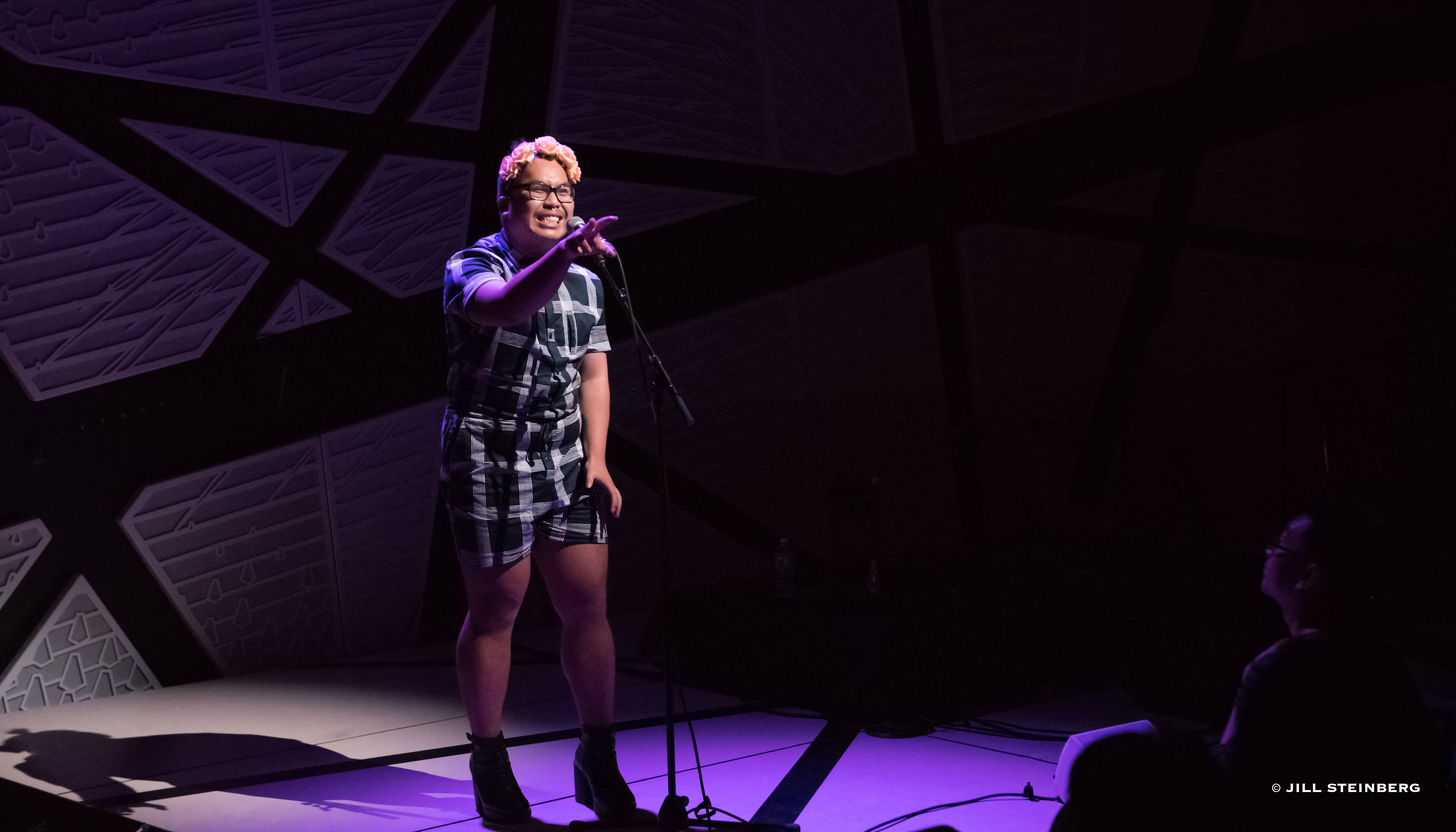
ELENA PARK: Mai, you had a kind of transformative moment. In 2010, you won the Television’s Album of the Year and song of the Year, which is a huge, huge thing. It would be like the Grammys here. This was like the peak of stardom in Vietnam. And then, you shaved half your head, and you went on a different path. Can you tell us about that moment?
MAI KHOI: I was so happy when I won the Song of the Year award, and I shaved “VN”, the name of the song, into my hair. I was just expressing myself freely in a different way. At that time, I was already resisting ideas about what it means to be a Vietnamese woman, and I went against the social norm about what Vietnamese women had to be like. After I won the award, I changed my hair, and it shocked people a little bit.
ELENA PARK: And then you continued on that path. You became very outspoken about free speech. You had the occasion to meet President Obama in Hanoi when he went there in 2016, and then you were happily covered in the global press for testing the limits of free speech. I know that you had encountered some censorship in your music with your lyrics. Can you talk about what the relationship to the government was when you were just trying to sing songs and create work?
MAI KHOI: I released many albums before—about seven or eight albums. Everytime I released a new album, I had to submit all of my lyrics to the censorship system. If they didn’t like something in my lyrics, they forced me to remove the song from the album, and it hurt me. Why do they have that right? I was very angry because I’d been censored, but I didn’t know what to do.
But then, I got bored with the censorship system. I got bored with artists who censor themselves. In 2016 a friend had an idea, and said “Mai Khoi, you can nominate yourself for the National Assembly election.” I didn’t know that I was allowed to do that. I took a few days to think about this, and that nomination really changed my life. After my nomination, three weeks later, my show was shut down. The police came and raided my shows and they posted an article about it to let people know that I was effectively banned from singing in public. I was evicted from my house two times. I was under surveillance twenty-four/seven. So many problems happened to me since my nomination. At the same time, my country had a big environmental disaster, and people come out onto the streets and protest every week, and I’m an artist. I can’t be silent. I just cannot be silent in front of that.
“In Vietnam people say, ‘You cannot say things impolitely like that. You cannot use the word piss.’ I was just practicing my basic right: freedom to protest peacefully, freedom of expression.”
— Mai Khoi
ELENA PARK: And things really got worse for you after you protested President Trump’s visit.
MAI KHOI: People were very angry when I did the protest. In Vietnam people say, “You cannot say things impolitely like that. You cannot use the word ‘piss’. I was just practicing my basic right: freedom to protest peacefully, freedom of expression. It sparked a huge debate about these things, and people talked about this for a month in Vietnam. Internationally, it has raised awareness about how basic the rights in Vietnam are.
ELENA PARK: I know that you just did a European tour with your band, and I just wonder how your fans can keep up with you since you can’t perform in public. How do you keep in touch with them? How do you provide them with hope and tell them what you think they should be doing in terms of protesting and agitating for change?
MAI KHOI: It’s really hard for me to promote myself and the band when I cannot do the advertising, even on my Facebook. Facebook used to be the only space where we could speak freely in Vietnam, but now, it’s not free anymore. The cyber-security law in practice now silences people. People don’t dare to talk about what they want to talk about. Even me. I used to sing on Facebook. I would livestream when I could not sing in public. I used livestream on Facebook to do my own concerts. And people could still listen to my new songs through that. But now, I cannot even do that, because they can come and arrest me right away, very easily.
ELENA PARK: One of the things we can be grateful for is that you win these international human rights awards and people know about you around the world. They can be looking to see how the government is treating you, and I hope that gives you some measure of relative safety.
MAI KHOI: I know international organizations and the international press and media are helping me a lot. They have saved me from problems. Every time I got detained, it has been for just one minute. The news about my detainment goes on the international press and puts pressure on my government to release me.
ELENA PARK: This is the eight hours you were held in questioning when you came back from a tour last year. Is that right?
MAI KHOI: Yes, and also the winning VÁCLAV prize, and this prize’s existence in general, has inspired many people to do the same thing: to speak without fear, to create art without a censorship system, and to stand up for human rights.
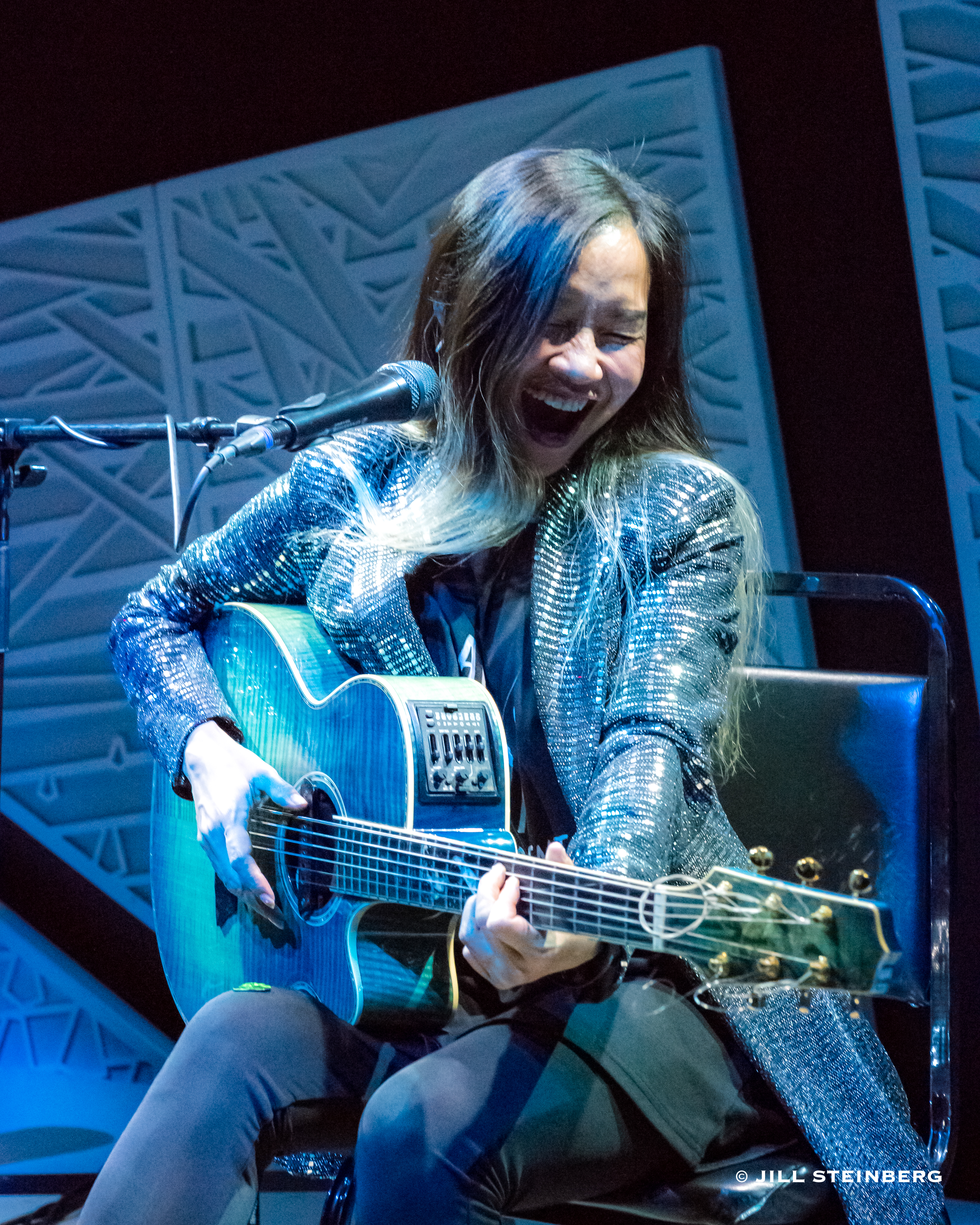
ELENA PARK: Paul, in your work, you stand up for freedom, and it’s such a bold voice that you share. How do you write and perform personal, passionate, and difficult work, because some of the stories that you tell, like “Dry Clean,” are you personal stories, and you deliver them with such emotion. How are you able to write that and do that and remain whole?
PAUL TRAN: I answer this the way I teach it to the high school students I coach through poetry slam. I tell them, “That difficult event—we have survived it. And the writing should not recreate that. The writing, even though it appears incredibly intense or emotional, is in no way designed to trigger our own selves to go back to that place. Otherwise, that would be irresponsible to ourselves and to our own safety”. In poetry slam, I talk to them about power, control, creating an experience for the room, because essentially, no one really wakes up needing my story or telling themselves they need that. Not in my imagination, anyway. And most folks who I tell these stories to, will respond back saying “That’s unbelievable.” And I want to say, “Your inability to believe it is part of why the violence occurs, why the assailants get away with it, and why there’s little rehabilitation or justice for survivors.”
And so, when I do my work, it would be misleading or inaccurate to say that it’s about that trauma or that experience. I have a question that I’m trying to answer. I have an investigation that I’m trying to conduct through that story, and what I’m trying to do is something that I think white, cisgender, male writers have been canonized for doing, which is, presenting a speaker that is capable of the acquisition of knowledge, that is capable for standing in for humanity. Instead of having that speaker or character be those things, or a neutral subject, I want people to know that my speaker is myself, or is someone like me, and that I’m capable of the same kind of humanity, of the same kind of critical thinking, of the same kind of emotional depth, that all of your favorite characters are. And I have to do that from my particular experience. Otherwise, someone’s just going to look at that and say, “Oh that’s just a rape poem. That’s just an immigration poem. That’s just a blank, blank poem,” which devalues the integrity of the work. INo, it’s actually about ownership. It’s actually about agency. And they elide that. So part of the work is making that undeniable.
ELENA PARK: Mai how do you find singing these really intense, difficult songs? Does it bring you back to when you wrote them and what you were feeling, or are you able to distance yourself? We feel it very powerfully in the audience.
MAI KHOI: Yes, instead of writing articles or poems, I write songs. In this moment, what I feel, what I see, what I understand—I will write it down and sing it loud. And I’m very lucky to meet this dissident guy Paul. Music is very different from writing. We need a community. We need to work with other artists and musicians to make art stronger, and expressed as powerfully as possible. I’m very lucky to have met this guy and my group in Vietnam, so we can create the songs that I want. Everytime I play my songs, I feel that all of my energy is put into my songs and the songs will transfer to the audience. I feel tired, but at the same time I feel like I am receiving something meaningful.
“Vietnam has too many social norms and it is very difficult for women to do what they want, even if it’s just dressing like they want. ”
— Mai Khoi
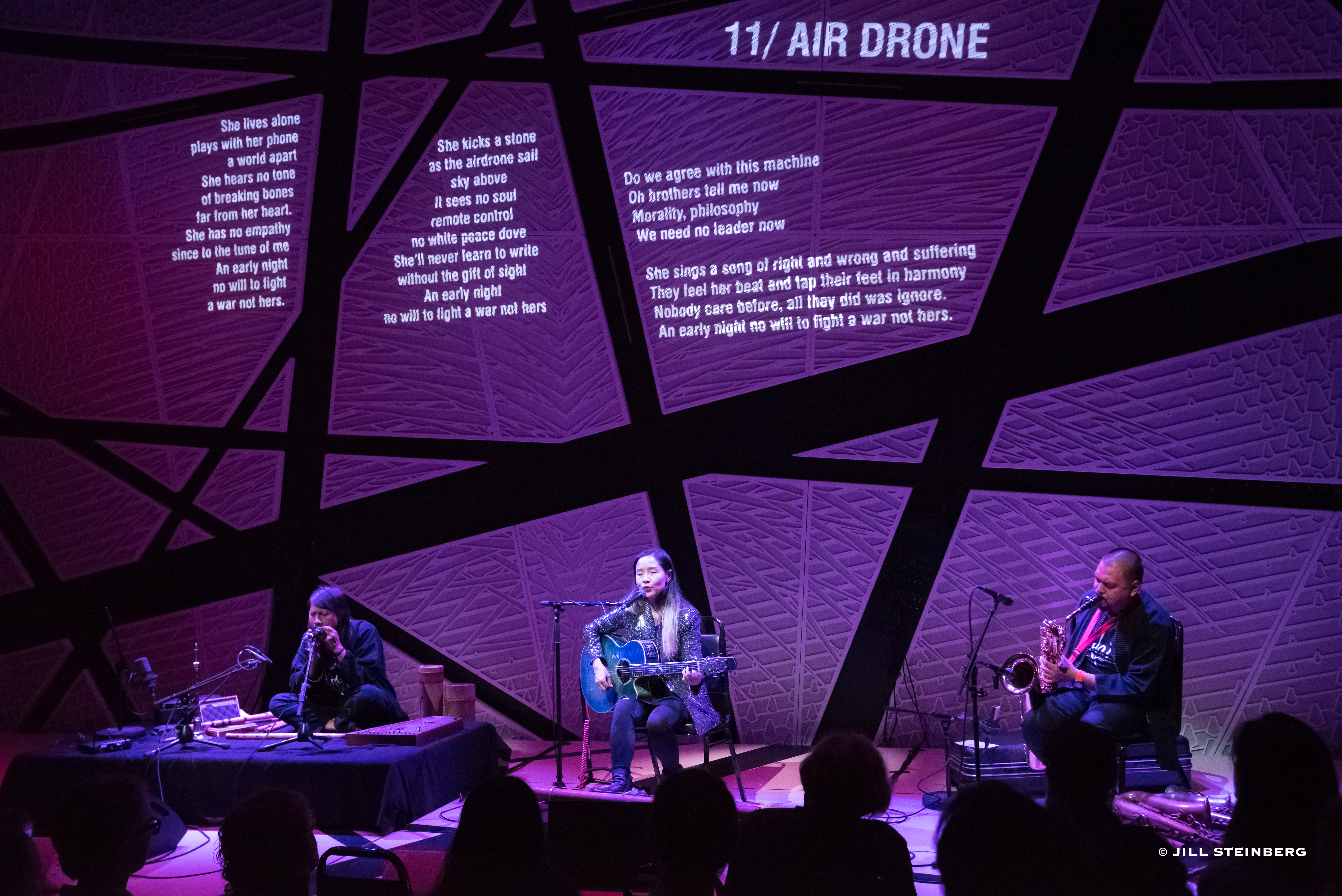
AUDIENCE MEMBER: My question is to Mai Khoi, because I believe there have been strong women in Vietnamese history, in poetry over the years. And I’m wondering if in some ways you are a part of that tradition of strong women, rather than, the traditional women you were talking about earlier. There are also strong women in Vietnamese history and I just wondered, particularly in poetry and literature, if you could say something about that.
MAI KHOI: In my country’s history, the first two kings were women. They make for a strong image of women for the country, but I don’t think it is particularly good or bad, because I do not know if that is a true story or a fake story. But, in my generation, women still lack their rights to express themselves as they want, because our society of Vietnam has too many social norms and it is very difficult for women to do what they want, even if it’s just dressing like they want. Maybe I am telling a different story, but that’s what I’ve seen. What do you think, Elena?
ELENA PARK: I was going to say, earlier in your career when you were pushing norms about sexuality, championing LGBT rights, and protesting violence against women—before you started really being so much of an activist—you had a really hard time, right?
MAI KHOI: Yes, I participated in some activities to promote LGBT rights and women’s rights. I wrote a song about how beautiful it is when women feel free to show their bodies.
PAUL TRAN: It is really an honor to be in this space and to witness you because so much of Vietnamese poetry comes from songs. We come from people who have been historically illiterate at times, and how one passes down culture and traditions were through the songs, whether in Đại La or otherwise. It’s sang in the fields. It’s sang in lullabies. You see, with the lyrics and translations projected on the screen, all of those literary devices evident in your lyrics and your songs, and so I think it does sit in that same tradition. As a trans femme person, it’s amazing to see you and that power and brilliant grace be added to that long tradition of women writers from our country.
AUDIENCE MEMBER: Can you talk a little bit about the choices you made and why you wore what you wore?
PAUL TRAN: I love how when you asked that question, you took your shades off, real good and slow.
ELENA PARK: I must say that she works in fashion and design if you didn’t know.
PAUL TRAN: When I left home and came to New York City and was away from my family, I was like “Holy shit, this is the time.” My little sister came out as trans years before I did, and I think her transition was incredibly inspiring to me because she grew up with Tumblr, whereas I was the Myspace generation, so we got really good at this. But she had access to all these radical ideas and languages that were so easily reblogged, and it gave her that freedom and permission first. I learned makeup from her—still not good at it. But for today, this is ASOS. I had a sheer situation planned, and I forgot to plan a situation for under the situation, which I realized this morning. So we are repeating something from Friday night. Forgive me.
MAI KHOI: I really admire your style.
PAUL TRAN: Cảm ơn nhiều! [Thanks a lot!]
MAI KHOI: I’m very emotional when I read your poems and see the way you act; it triggers something deep inside me. I nearly cried. I know your style is telling something. Just like the way I dress is telling something too. But we let the audience feel it themselves.
AUDIENCE MEMBER: I just want to thank you. I know exactly how you feel. I’m from China. The way I look now—I cannot dress like this in China. But here we are, in the United States. I’m very grateful, and grateful for your performance, your expression, and being who you are. That’s the core of being an artist. That’s your heart that you have given to the audience, and I want to give you my energy and my support for what you do. Keep it up. It’s great.
ELENA PARK: Paul, I know you are working on a collection of poetry, and that you came to writing poems after you were doing spoken word and won a New York and Poets Cafe and all the other things you have won. We look forward to more of your words, live or written—however you choose to share them. Mai Khoi, it’s such a pleasure to have you in this space. It’s funny because you get compared to Pussy Riot a lot (and Lady Gaga), and Pussy Riot was actually on this stage a year ago with Pussy Riot Theatre. So it’s a pleasure and an honor to witness what Paola Prestini and the space believes you both embody. I want to thank you for being on this stage today. And PEN America!
Transcript of the discussion by Nadia Ahmed.






